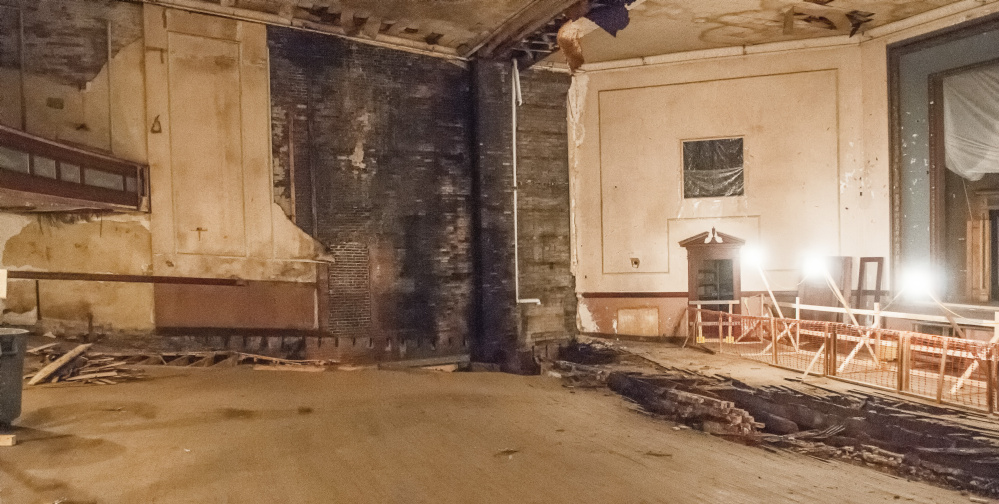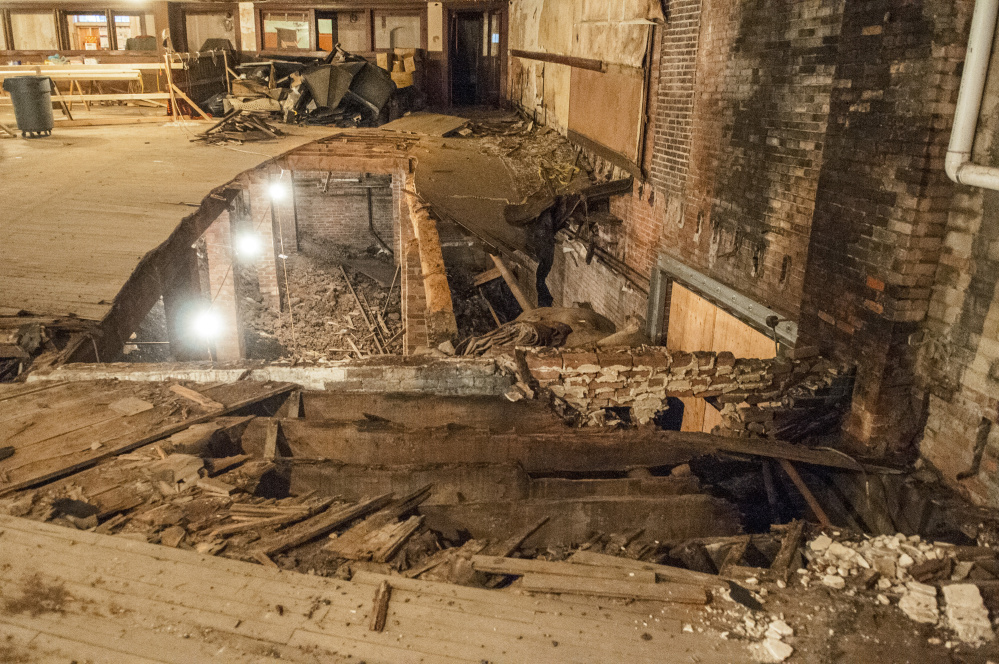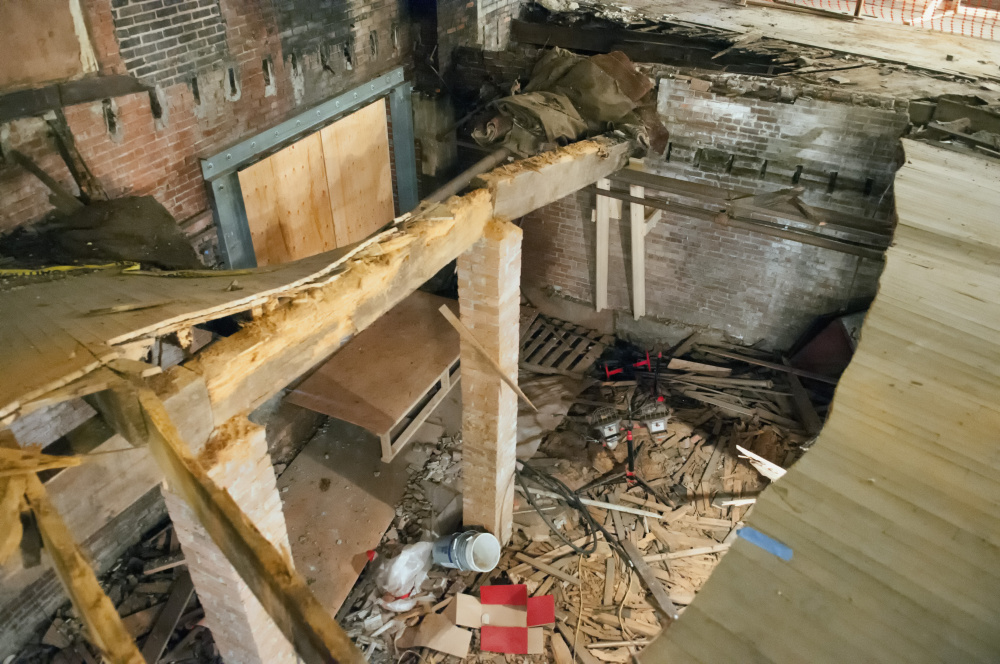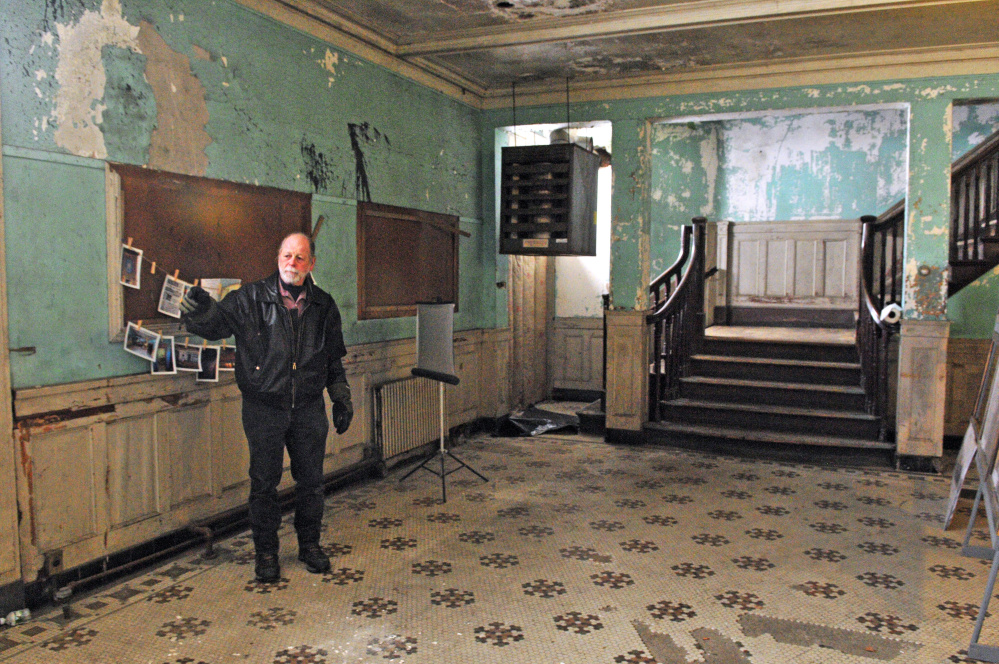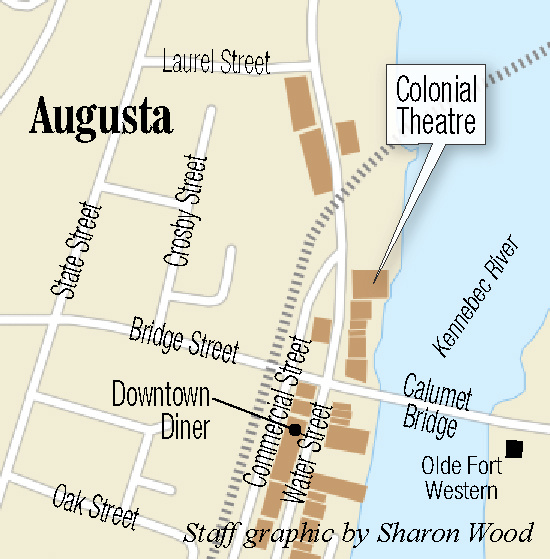AUGUSTA — Colonial Theatre supporters plan to ask city councilors Thursday to speed up the release of $300,000 the city has committed to the project, including turning over $30,000 as soon as possible to help solve environmental problems that are preventing the repair of a gaping hole in the floor.
The nonprofit group seeking to restore and reopen the downtown Augusta theater received a $100,000 donation from Kennebec Savings Bank in August. But that funding is designated specifically to fix the theater’s floor, which has a huge hole in it in front of the stage, and structural damage to the floor support beams.
When a contractor went to begin replacing the floor, however, it was determined that for a construction crew to be safe while repairing the floor, a combination of coal ash and asbestos in the basement needs to be cleaned up. While the final solution hasn’t been determined yet by an environmental consultant, it probably would involve removing some of it and encapsulating anything left behind, according to Tobias Parkhurst, chairman of the theater’s board of trustees, and a downtown business and building owner. Parkhurst said the trustees think the work can be done for about $60,000.
Parkhurst said it is believed coal ash, left from years of coal being used to heat the structure, was thrown into the basement. The asbestos, meanwhile, is from wrapping on utility pipes that was damaged over the years, some of which fell into the basement, contaminating the coal ash.
Parkhurst said everyone knew some level of environmental cleanup would be required, but it wasn’t known how much, nor that it would need to be done before the floor could be replaced. That realization comes at a time when the nonprofit organization doesn’t have cash available for the work. About $750,000 has been raised, or committed, to the project so far, but Parkhurst said that money either already has been spent on repairs to the building or is committed to other aspects of it.
“What we didn’t know was the work in the basement that needed to be done would need to be done before everything else,” Parkhurst said. “You don’t want workers working in an area that has got asbestos contamination. And we don’t have the money available to designate to fix that. We’re not asking (the city) for additional money. We’re asking them to partner with us to release 10 percent of the money they’ve already committed, and help us get over this cash flow roadblock.”
In October 2016, city councilors voted unanimously to commit $300,000 in city money, left over from the Lithgow Public Library renovation and expansion, to the Colonial Theatre restoration. But at City Manager William Bridgeo’s suggestion, they specified the money won’t be paid to the nonprofit group until the project, estimated to cost around $6 million to build, is substantially complete and has a certificate of occupancy. At the time, Bridgeo said that condition was placed on the city grant money so taxpayer money would not be spent only to see the project fail, such as if too little money is raised from other sources, or the work doesn’t take place for any reason.
Bridgeo, who met last week with Parkhurst and Andrew Silsby, a theater board member and Kennebec Savings Bank president, to discuss the issue, said their request “sounds reasonable” and he encouraged them to make a formal request for the council to consider. Councilors are scheduled to hear and discuss, but not vote on, the request at their 6:30 p.m. Thursday meeting, in council chambers at Augusta City Center.
Parkhurst thinks fixing the hole in the floor will make fundraising easier, and he is hopeful councilors will recognize the project has progressed significantly, has wide support in the community, could help the ongoing revitalization of downtown and is going to happen.
“I don’t think there is any question at this point whether or not the project is going to happen,” he said. “We’ve raised three-quarter of a million dollars. We made some important structural upgrades to the building. We’re pretty far along in the design of the building. I think we’re in good shape. But the building still looks scary, and we think fixing the floor will make it look a lot less scary. It looks like a horror show right now, so it’s hard for people to see the vision. And when you’re raising money, people need to be able to see the vision.”
Organizers hope to raise about $8.5 million for the project, with about $6 million of that for construction. About $2.2 million of the funding is expected to come from state and federal historic preservation tax credits.
The theater group also asks, in a letter to the city, that the time frame for turning over the remainder of the $300,000 be accelerated. Instead of being granted at the end of the project, the group asks, in addition to the $30,000 sought now to do the environmental work, that $70,000 be released to the project when all construction documents are completed, and then the remaining $200,000 be released when a construction contract for the project is awarded to a general contractor.
Keith Edwards — 621-5647
Send questions/comments to the editors.


